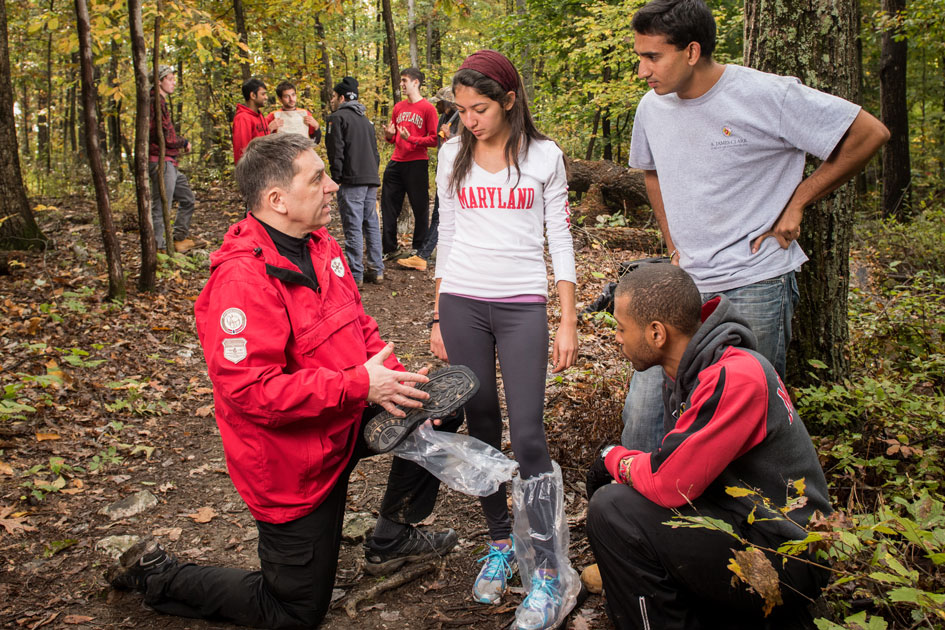
Oliver Schlake has been teaching innovation since age 17, when he was tapped by his local community college in Germany to create a computer science program from scratch. In the early days of home computers, Schlake became one of the youngest professors in Germany.
“I built the computer science program, because there was nobody else with that skillset,” Schlake says. “I was running the show for several years.”
Today, Schlake is in a similar role, building the entrepreneurship fellows program at the University of Maryland's Robert H. Smith School of Business. He calls himself an “edu-preneur,” constantly creating new and interesting experiences to teach entrepreneurship and innovation.
“I see our students as a product with a 25-year warranty," Schlake says. "I would like them to be a high-end product: Very successful in the marketplace, and either highly desired by employers or qualified enough to find their own way in life.”
Schlake tries to employ this mindset to his capstone courses as a professor at Maryland Smith’s many campuses. There’s no set standard for how to teach innovation strategy, business creativity or any other components to entrepreneurship, so Schlake takes an experimental approach that gives his students real-world experience.
“The role of a university, as I see it, is to open doors," he says. "I want to be the person who brings along the key. My students can experiment in a realistic environment, within the cocoon of being saved by the university.”
This semester, he’s tasked his students with raising $35,000, through any means possible, to fund a class Silicon Valley spring break trip to connect with successful companies and entrepreneurs. He’s encouraged students to try to go viral online, get onto major newscasts and come up with ideas that will get venture capitalists to listen. There’s a lot on the line.
"Just imagine if this experiment does not work," Schlake says. "Like any good entrepreneur, we have a Plan B," which means scaling down to a one-day trip to startups in New York City.
Last year, his class experienced similarly high stakes. Students worked with Under Armour, a corporate partner, to develop sports equipment and evaluate current technologies. The class culminated with a visit to the company’s Innovation Center.
Schlake’s entire career has been a series of risks. After gaining a Phd in mechanical engineering from a German university, he started a consultancy with nothing other than classroom experience. He and his partner raised close to $750,000 from investors and were able to turn his Phd thesis into a successful consulting firm.
“When I encourage my students to start a business out of school, I am privileged to say I am walking the talk,” Schlake says. His consultancy, ScMI, is still around today.
Part of his work — consulting for companies like Siemens, Audi and the U.S. Department of Defense — is introducing the concept of improvisation. The most skilled improvisers, like talented artists and musicians, are the most prepared for the unknown, he says.
“From an evolutionary perspective, adaptability is human nature’s best way to deal with unforeseen events,” Schlake says.
He emphasizes that entrepreneurship is not a trait you’re born with, nor does it only apply to people like himself, who want to start a business. His new corporate venturing class teaches students entering established corporations how to start businesses from within.
“Entrepreneurship is a mindset, a different way of approaching life, that can help you no matter what,” Schlake says.
— Kira Barrett, Communications Writer at the University of Maryland’s Robert H. Smith School of Business
Media Contact
Greg Muraski
Media Relations Manager
301-405-5283
301-892-0973 Mobile
gmuraski@umd.edu
About the University of Maryland's Robert H. Smith School of Business
The Robert H. Smith School of Business is an internationally recognized leader in management education and research. One of 12 colleges and schools at the University of Maryland, College Park, the Smith School offers undergraduate, full-time and flex MBA, executive MBA, online MBA, business master’s, PhD and executive education programs, as well as outreach services to the corporate community. The school offers its degree, custom and certification programs in learning locations in North America and Asia.